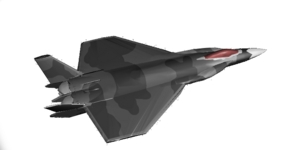AC/A-92 Night Adder
| AC/A-92 Night Adder | |
|---|---|
 Blueprint of the AC/A-92 Night Adder | |
| General information | |
| Type | Stealth Multirole Fighter |
| Manufacturer | Incorporacion Estavez-Kalmov (IEK) |
| Status | In service |
| History | |
| Manufactured | 2014-present |
| Introduction date | 2015 |
The AC/A-92 "Night Adder" is a Generation 5 multirole fighter developed for the Inyurstan Navy, and has been adopted by the Inyurstan Airforce and other international services. The Night Adder is a Short Take-Off and Arrested Landing (STOBAR) aircraft designed to be able to take off from smaller surface ships, such as amphibious assault ships and aviation cruisers.
Development
Design
Stealth
The Night Adder is designed for all-aspect stealth, wherein the aircraft is significantly more challenging to detect at all angles compared to 4th Generation contemporaries.
This aircraft is created and painted with radar absorbent materials, in addition to its low-RCS frontal shape. Ducted intakes and s-shaped engines eliminate the returns of the engine, while the opening edges and walls of the intakes are built with radar-absorbent materials. As a singular delta-wing design, it has less wing surfaces to reflect radar, while a pair of canted vertical stabilizers (tail) provide lower radar returns that single or double straight-standing vertical stabilizers. Rather than traditional canards, it utilizes Leading-Edge Vortex Controllers (LEVCON)s, which result in less radar returns than traditional frontal canards but more maneuver control than LERX. However, in terms of shape and design, the LEVCONs still create the same radar returns as do a deltawing + LERX aircraft, which represent the lowest RCS return values of any deltawing design. It is rumored to have a frontal RCS of 0.000085-0.0001m2, although no formal data has been confirmed by the Inyurstan armed forces.
To reduce infrared signature, the Night Adder has built-in active cooling systems located in the leading edge of the wings, vertical stabilizers and at the edge of the engine nozzles & rear underside of the fuselage (below the active engine). Positioning of the engine outlets is also shielded from side angles by extensions of the fuselage and support for the rear stabilizers.
Weapons are stored in a 2.8m x 4.3m internal weapons bay with 2x2 pylons. An additional pair of side bays can fit either short-range air-to-air missiles or the ASM-130F Glide Rocket. Improvements to both weapons carrying capacity while maintaining stealth post-launch come in two forms:
Performance
The Night Adder is designed under the doctrine of "maneuverability at speed, at distance". Wherein earlier 4th generation aircraft, such as the AC-88 Taipan focused on super-maneuverable stunts at extremely close distances (sometimes inside of 5km of the enemy aircraft) usually at subsonic speeds, the AC/A-92 focuses on being able to maintain supersonic speed while being able to escape or mitigate an enemy's missile sight, often at distances of >20km away or more.
It is powered by two Motusi FE-2006 turbofan engines, each with a dry thrust of 108kn for a combined dry thrust of 216kn. The exact "wet thrust" numbers are still classified from both Mericki and Inyurstan sources, but it is estimated to be in the range of 300kn combined.
With a thrust-to-weight ration of .73 at maximum payload and maximum fuel capacity
Avionics
The primary radar system of the AC/A-92 is the ESQ/MS-90 LAST (Low-intercept Air & Surface Tracking) AESA, a.k.a "Last Call", by Seratto Defense Solutions. With over 1,750 transmit/receive modules, this system has a claimed intercept range of 230km for targets with an RCS 1m2, and when operating in SAR mode can track up to 24 moving ground targets within a 75km radius. Electro-Optical Search & Track (EOST) is provided by the CAT EYE II system. Integration of the CAT EYE II and Last Call systems means that the AC/A-92 can rapidly identify and engage multiple targets. In theory, both systems can work independently to increase the number of targets engaged; though in practice targets would likely be "overlapped" and allow the pilot better recognition and weapons decisions.
Anti-radiation capabilities are provided by the Sevât-M Counter-Emissions System, and last-resort countermeasures are the advanced LIDACS-III Counter-Measure Suite.
Variants
AC/A-92A:
AC/A-92-LSE1: Carrier-capable variant, including a tail hook and...
AC/A-92(Mericki Designation):
AC/A-92CEM:
Commercial Export Model:
History
It is expected to serve in Inyurstan and Mericki services until at least 2050.
2007 Engine Scandal
Specifications
Crew: 1
Speed: Mach 1.8 (1,370mph; 2,200km/h)
Range: 900nm (1,670km)
Combat Radius:
- Runway - Air-to-Air: 1,460km
- Runway - Air-to-Ground: 1,220km
- STOVL - Air-to-Air: 940km
Empty Weight: 14,500kg (32,000lb)
Payload: 7,260kg (16,000lb)
- Payload Catapult: NUMBER HERE (kg)
- Payload STOVL: 4,500kg (9,920lb)
Hardpoints:
- x6 Internal Undercarriage
- x2 Internal Side Sleeve
- x2 Underwing (optional)
- x2 Wingtip (optional)
Gun: x1 RK-27 "Warlord" 27mm autocannon
| Air-to-Air | Air-to-Ground | Anti-Radiation | Anti-Ship |
|---|---|---|---|
| C-120 Rapier | ASM-7 STRIKE | OCE-1 Chaos | ASM-4 Leviathan |
| C-170 Rapier II | ASM-11PE2 Barracuda | OCE-3 Entropéa | ASM-11 Scylla |
| C-80 Stilétto | AGM-84H/K SLAM-ER | AGM-88 HARM | ASM-13 Sirena |
| C-12 Éscouta | RY Rocket Family | AGM-84 Harpoon | |
| Python Family | CB Bomb Family | YU-7 Evening Tide | |
| MAA-1 | CBU-S Torencón | ||
| SJJ-9 Kouwayzar | AGM-130 | ||
| SJJ-10 Muthnib | AGM-158 JASSM | ||
| SJJ-11 Saiha | AGM-154 JSOW | ||
| AIM-120 AMRAAM | |||
| AIM-9 Sabre SRAAM |